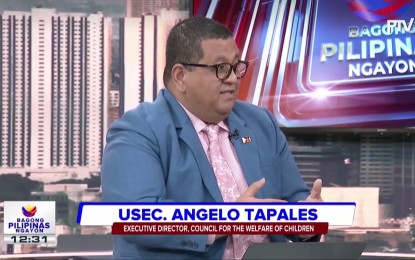
DIGITAL PARENTING. Council for the Welfare of Children (CWC) Executive Director Angelo Tapales urges parents and guardians to be responsible digital parents to combat online sexual abuse and exploitation of children (OSAEC), in an interview at the Bagong Pilipinas Ngayon briefing on Friday (April 26, 2024). He also encouraged the public to help the government in its crackdown against offenders and abusers of children. (Screengrab from PTV)
MANILA – The Council for the Welfare of Children (CWC) on Friday underscored the need for responsible digital parenting to combat online sexual abuse and exploitation of children (OSAEC).
The CWC made the statement after the Department of Justice (DOJ) reported an increase in OSAEC incidents, with the age of victims averaging 11 years old, and the youngest being three months old.
During a Bagong Pilipinas Ngayon briefing, CWC Executive Director, Undersecretary Angelo Tapales, told parents and guardians to be vigilant in identifying red flags online.
"Let us be responsible digital parents or digital adults. Para po doon sa mga oldies natin ng kaunti, mag-aral po kayo ng Internet, social media, iyan mga gadget… para po alam po natin kung paano natin tuturuan ang ating mga anak (For the older ones, learn about the Internet, social media, these gadgets, so that we know how to teach our children)," he said.
Tapales, however, noted that the biggest problem is the "wrong mentality" of its facilitators.
According to the DOJ report, 41 percent of reported OSAEC incidents were facilitated by biological parents, while 42 percent were done by other relatives.
"Ang iba pong magulang o mga kamag-anak ng bata ay wala silang nakikitang mali dito dahil pinipiktyuran lang naman daw o bini-video iyong bata (Some parents or relatives of children don't see anything wrong with this because they think they are just taking pictures or videos of the child), so no touch," he said.
"That is something that we want to eradicate, that bad mentality, that wrong mentality kaya po nagki-create talaga tayo ng (that's why we're creating) social awareness, and of course, we want to promote responsible digital parenting."
From 2019 to 2020 alone, the DOJ Cybercrime office already recorded a 264 percent increase in cybertips.
From March to May 2020, the DOJ's Office of Cybercrime received 279,166 cybertips, which is relatively higher than the 76,551 cybertips for the same period in 2019.
"Ito po iyong puwedeng imbestigahan ng ating mga pulis and eventually i-pursue at maging kaso (These may be investigated by the police and eventually be pursued to become court cases)," Tapales said.
He encouraged Filipinos to help the government in its crackdown against OSAEC by reporting such cases through its hotline number Makabata helpline 1383.
President Ferdinand R. Marcos Jr. earlier ordered government agencies to ramp up efforts against offenders and abusers of children. (PNA)
